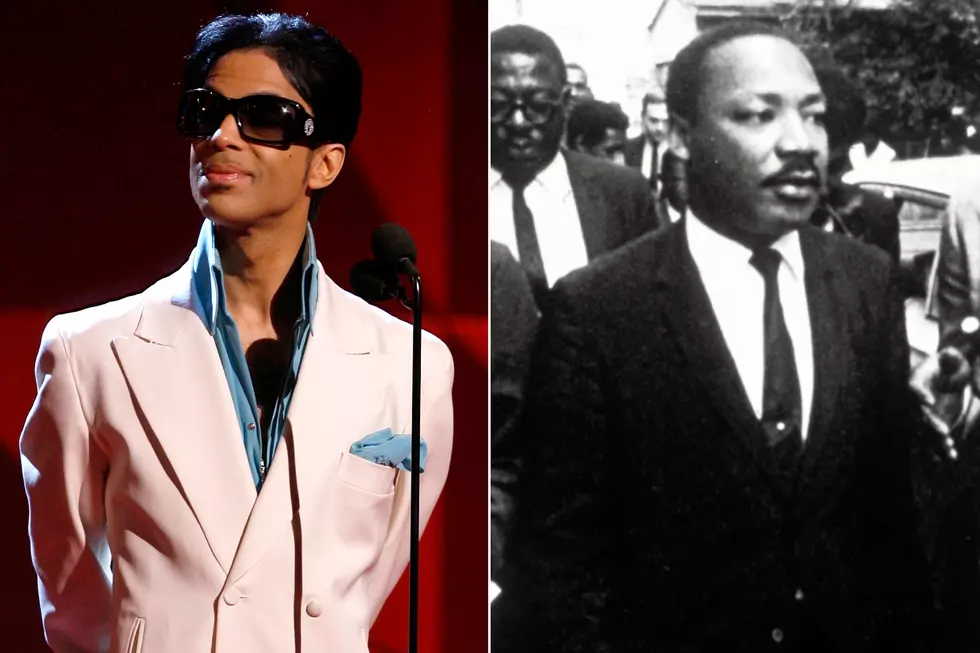
The Many Ways Prince Honored Martin Luther King, Jr.
Prince Rogers Nelson was only nine years old when Martin Luther King Jr. was brutally assassinated.
That's far too young to have personally felt the impact of the civil rights leader's actions while he was alive. Still, like many people in all walks of life, Prince was profoundly affected by the work, words and legacy of Dr. King -- routinely paying tribute to activist many times throughout his illustrious career.
The rocker’s initial tributes were subtle. In fact, most fans would be completely unaware of his involvement on the 1986 single “King Holiday.” The track was created to honor Martin Luther King, Jr. Day, which became a U.S. national holiday that year. King’s son, Dexter Scott King, spearheaded the project alongside hip-hop producer Kurtis Blow. Following the model of “We Are the World” (which had been released the year prior), Blow assembled a group of the era’s young stars for the track, including Whitney Houston, Run-D.M.C, New Edition and El DeBarge.
Despite excitement around “King Holiday,” the production went over budget, leaving no money left to create a music video. Prince got word of the issue and contacted Blow directly. “Prince said, ‘I’ll pay for it,’” the rapper recalled in a conversation with YouTube channel VladTv. “He paid $90,000 for us to shoot this video. Straight out of his pocket, never asked for it back.” Though Prince did not appear on the song or in its video, he did visit the set of the production he paid for. “Thank you for that video. Thank you for doing that,” Blow recalled saying to Purple One. “He said, ‘No problem. It’s all good. It’s Martin Luther King.’”
Soon thereafter, Prince planned his own visual salute to King. In an early draft of the 1990 film Graffiti Bridge, the musician planned to have King’s name scrawled on the titular bridge alongside other luminaries Billie Holiday, John Lennon and Jesus Christ (the plan would eventually be scrapped).
A more prominent homage came in 1995, when Prince channeled the message of Dr. King on “We March,” a track on his seventeenth studio LP, The Gold Experience. The song’s lyrics focused on racial discrimination, while also touching on economic issues and gender inequality. "Next time, we march" is a phrase repeated in the chorus, its sentiment echoing the protests lead by King in the ‘50s and ‘60s. The normally peaceable singer even got surprisingly aggressive towards the end of the tune, clearly a result of his frustrations over continued racial disharmony. "We ain't got no time 4 excuses, the Promised Land belongs 2 all / We can march in peace but U best watch your back if another leader falls," the iconic musician proclaims.
“We March” featured backing vocals by Nona Gaye, daughter of legendary singer Marvin Gaye. Shortly after The Gold Experience’s release, the Artist Formerly Known as Prince (as he was then called) was honored with the American Music Award of Merit, the highest honor bestowed by the annual awards show. It was Nona who presented the award to Prince during the event’s national broadcast. Following a raucous performance -- whose overtly sexual content upset the television censors -- the Purple One proudly accepted his trophy. “I’d like to quickly thank a few people whose inspiration contributed greatly to Prince’s success,” the soft-spoken icon explained before name-dropping a list of collaborators and influences which included Muhammad Ali, James Brown, Joni Mitchell, Jimi Hendrix and Dr. Martin Luther King Jr. “Without their inspiration, there wouldn’t be a reason for me to be here tonight.”
Watch Prince Perform and Accept His Award at the 1995 AMAs
It was during this era that Prince was also embroiled in a well-known battle with his record label, Warner Bros. The musician felt trapped and imprisoned by his contract with music conglomerate and made it clear that he considered Warner Bros.' treatment unfair. When Prince eventually broke free from Warner Bros. and released his Emancipation album in 1996, he celebrated with a performance titled "The Freedom Train Rolls in Minneapolis.” The concert was broadcast live on MTV, VH-1 and BET. Before Prince began his set, an excerpt from Dr. King’s “I Have a Dream” speech played from the stage, the words "Free at last! Free at last! Thank God Almighty, we are free at last!" resonating as Prince launched into his first song, “Slave.”
Five years later, in 2001, Prince again utilized “I Have a Dream” on his 24th studio album, The Rainbow Children. The LP featured the song “Family Name” which tackled the topic of racial inequality head-on by delving into the history of slavery and social divides in America. The poignant track closed with a sample from Dr. King’s speech, the civil rights leader proclaiming: "And when this happens, and when we allow freedom ring, when we let it ring from every village and every hamlet, from every state and every city, we will be able to speed up that day when all of God's children, black men and white men, Jews and Gentiles, Protestants and Catholics, will be able to join hands and sing in the words of the old negro spiritual, ‘Free at last! Free at last! Thank God Almighty, we are free at last!’"
Prince’s frustration with racial inequities continued late in his career. The song "Dreamer," released as part of 2009's Lotusflow3r, found the rocker pondering just how far society had really come since Dr. King’s murder. Later, he became a vocal proponent of the Black Lives Matter movement, penning the 2015 song “Baltimore” after watching the story of Freddie Gray, a 25-year old African American who died in police custody.
Through these and many other examples, it’s clear that Dr. King had a profound influence on Prince, both as lyrical inspiration and by instilling a sense of social responsibility in the prolific musician. In that way, the two will always be intertwined, despite the fact that they never met. Nor were they related, as Bart Simpson would have to learn the hard way.
More From KOOL 101.7





![The Day Martin Luther King Died [Photos]](http://townsquare.media/site/163/files/2011/04/images1.jpg?w=980&q=75)
![Martin Luther King “I Have a Dream” [VIDEO]](http://townsquare.media/site/163/files/2011/01/3142661.jpg?w=980&q=75)

